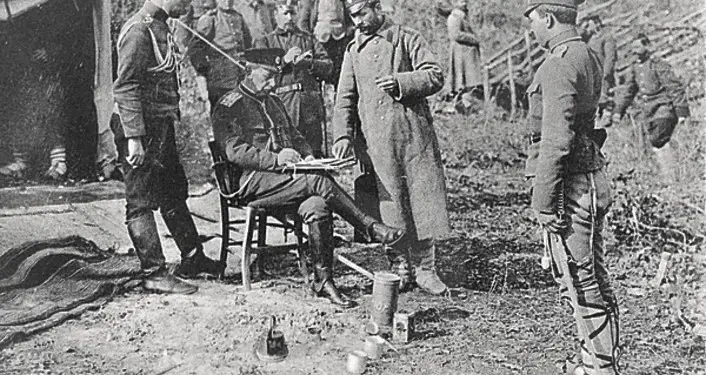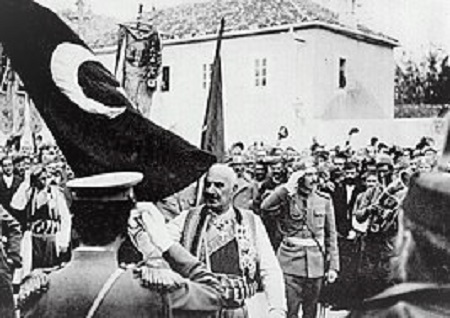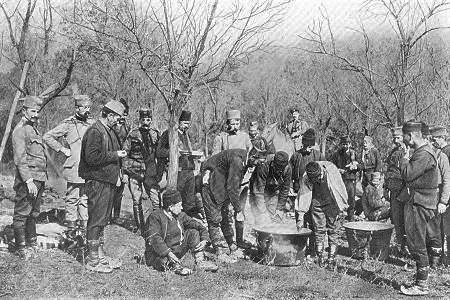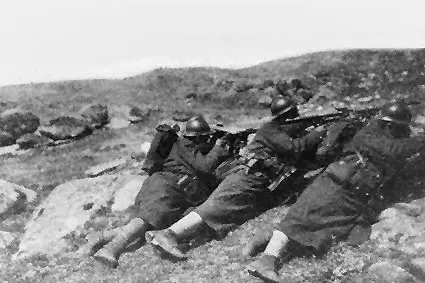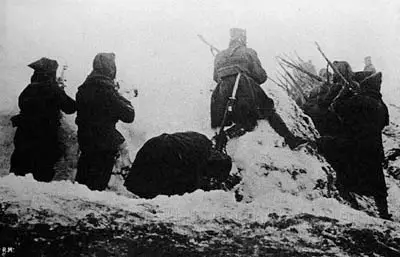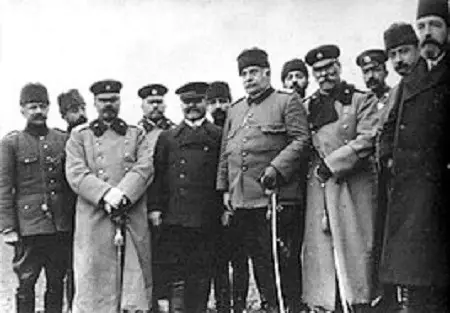From Bashkim Trenova
The first part
ALBANIANS ACCORDING TO THE SERBS
(THE EASTERN CRISIS AND THE BALKAN WARS)
Memorie.al / “The Serbs are derived from the Slavs, a large number of tribes that gave birth to the Slavic peoples. Knowledge about the origins of the history of the Slavs is modest and not so clear. Their name appears for the first time in the 6th century AD, when Byzantine writers begin to talk about the Slavs…”! (Dushan Bataković, Milan St. Protic, Nikola Samardžić, Aleksandër Fotic. History of the Serbian People. L’Age d’Homme. Lausanne. 2005. Pg. 3.)
Preface
As the title of this volume indicates, the analyses, interpretations and comments included in it are set in a limited time frame: the years of the Eastern Crisis and the Balkan Wars. These periods were deliberately chosen because they, with their consequences, lie in the foundations of Serbian-Albanian, or Albanian-Serbian relations for all the years to come, until our days. As an exception, in a few cases it goes before and after these years, simply to show a continuity of strategy, ambitions, practice and political trenches.
The volume presents the works and opinions of 125 senior Serbian politicians, deputies and leaders of political parties, academics, historians, writers and social activists, anthropologists, analysts, journalists, geologists, Serbian geographers and only Serbians. This choice is deliberate because it is always good to know opponents, enemies, mercenaries and their arguments, as well as those who oppose the former with realism, pragmatism or idealism.
In the volume, two currents, (if we can express it that way), of Serbian political and social thought about the events that are treated in it meet. For its preparation, thousands of pages have been consulted; more than 100 press and media bodies in general have been cited, as well as works and publications, mainly Serbian or referring to Serbian sources. In placing the material, alphabetical order has been followed. The exception is Chapter I where the chronological order is followed.
For reasons of practical use, the material presented is divided into four chapters. In the last three chapters, parts from the press of the time are also quoted. As a rule, the volume does not include Serbian or foreign archival materials, nor Albanian or non-Serbian authors. Of course, this volume does not include the entirety of the endless publications of Serbian authors that deal with this issue. But it is not his purpose to undertake the exposition of a space, where the authors often repeat each other.
Author
INSTEAD OF THE PROLOGUE – A PROJECT, TWO MEMORANDA AND AN ANALYSIS
The project or “Nacertania” of Ilia Garasanin – politician, prime minister of Serbia during the years 1852-1853 and 1861-1886:
Serbia should be placed in the ranks of other European states, creating a plan for its future or drawing up, so to speak, a long-term internal policy, the principles of which should be firmly adhered to and according to which it should to be guided and decide without wavering on all her affairs.
The movement and unrest among the Slavs has already begun and will never end. Serbia must fully understand this movement and the role or mission it will have in it.
If Serbia is aware of what it represents, of its position and of the peoples around it, it will understand that it is still very small, that it should not stay in such a position and that only in alliance with other people’s neighbors, she can perform the tasks for her future. Here lies the plan and foundation of Serbia’s policy, which does not limit Serbia to its present borders, but tries to unite all neighboring Serbian peoples.
If Serbia does not vigorously pursue this policy and, even worse, if it does not accept it, thus failing to prepare a well-thought-out plan suitable for this mission, it will be tossed like a small ship by extraterrestrial storms until in the bottom will break into a large rock. What we want and try to do here is to help and prepare the plan of Serbian politics respecting its natural requirements.
Serbian politics
The Ottoman Empire must disintegrate, and this disintegration can only happen in two ways:
- it will either split, or…
- it will be rebuilt again by its Christian inhabitants.
Observations on the division of the Ottoman Empire
…The Serbian state, which already has a good beginning, but which must strive to expand and strengthen, has its roots and strong foundations in the Serbian Empire of the 13th and 14th centuries and in the glorious and rich history Serbian. From this history it is known that the Serbian rulers began to take the position held by the Greek (Byzantine) Empire and almost succeeded in ending it to replace the collapsed Eastern Roman Empire with a Serbo-Slavic Empire.
Emperor Dushan the Mighty had even adopted the coat of arms of the Greek Empire. The arrival of the Turks in the Balkans interrupted this enterprise and, for a long time, prevented it from developing, but now that the Turkish power is broken and almost destroyed, the same spirit must act again, Serbia recover her rights and to continue the interrupted enterprise.
Therefore, the foundations and walls of the Serbian Empire must be cleared of all debris and debris, and uncovered, so that a new building can be built on these strong and stable historical foundations. Such an enterprise will be of inestimable importance, and will enjoy great prestige, among all nations and their cabinets; and then we Serbs will appear before the world as true heirs of our illustrious ancestors, not doing anything new, but restoring their legacy.
Thus, our present will not be disconnected from the past, but will form a unified, integrated and well-ordered whole. In this way, Serbia, its nationality and the life of its state, are under the protection of the sacred historical law. Our aspirations cannot be blamed as something new and baseless, as a revolution or as a coup d’état.
If we evaluate the revival of the Serbian Empire from this point of view, then other South Slavs will easily understand this idea and accept it with pleasure. Because perhaps in no European country the memory of the historical past is as alive as among the Slavs of Turkey, where the memory of famous characters and events of their history is strong and loyal. Therefore, it can be taken for sure that this enterprise will be easily accepted by the people…!
The Serbs were the first, of all the Slavs in Turkey, to fight for their freedom with their resources and strength; therefore they first have the right to continue this enterprise. Even now, in many countries and in some cabinets, the opinion that a great future awaits the Serbs is prevalent and this fact has attracted the attention of the whole of Europe.
If we were to regard Serbia as a mere principality, as it is today, and if this principality is not to be the nucleus of a future Serbian empire, then the world would care no more for Serbia than for the Moldavian and Vlach principalities where, no the principle of independent life is present and they are considered by her only as Russian pendulums.
A new Serbian state in the south could give Europe every assurance that it would be dignified and full of life, able to stand between Austria and Russia. The geographical position of the country, its topography, the abundance of natural resources, the fighting spirit of its people, its sublime and fervent national feeling, the common origin and the same language – everything speaks of its stability and promising future.
For the means by which the Serbian goal can be achieved
- Initial tools
In order to determine what can be achieved and how to act, the government must know the conditions and circumstances of the people who live in the surrounding provinces. This is the first prerequisite to precisely define the means. Therefore, it will be necessary, above all, to send living and unprejudiced people, loyal to the government, to observe the living conditions of the peoples in these lands.
In return, they should be required to provide accurate written reports. It is especially important to be informed about Bosnia and Herzegovina, Montenegro and Northern Albania. At the same time, the situation in Slavonia, Croatia, Dalmatia and, of course, the peoples of Srem, Banat and Backa are also included.
These agents must be provided with instructions on how to move and pass through these areas. They should be informed, among other things, about the places and people to whom they should pay special attention. In addition to these specific instructions, they should be given a general instruction, which will contain the following points, which they will be asked to implement:
First of all, let’s define our relations with Bulgaria
…Most of the important military positions of the Turks and more than half of their army are there. In no other European country does the Turk feel as safe as and more powerful than there.
All the weapons have been taken away from the Bulgarians; they learned to submit and to work—submission and diligence became their second nature. However, this observation should not prevent us from recognizing their true value, nor make us, what is worse, despise them. It is a pity that the Bulgarians, although they are the largest branch of the Slavic peoples living in Turkey, have almost no confidence in their own strength, but would dare to try to free themselves only under the pressure of foreign countries [Russia] .
….In short: Serbia must try to demolish, stone by stone, the edifice of the Ottoman state, preserving its good material to build, on the solid foundations of the old Serbian Empire, a new state of great serbian Even now, when Serbia is still under Turkish rule, preparatory work can be done, because such an action cannot be undertaken and completed at the last moment.
For Serbia’s policy towards Bosnia, Herzegovina, Montenegro and Northern Albania
When we take a closer look at the topography and geographical position of these lands, as well as the military traditions of their inhabitants, their mentality and way of thinking, we will easily come to the conclusion that, in this part of Turkey, Serbia can exert its greatest influence. The determination and continuous organization of this influence seems to us to be the main task of Serbian politics in Turkey at the present time (1844).
From these basic points it follows that if an attempt were made to change Bosnia before the general unification of Serbia; such a change should be made only in such a way that it would serve as a preparation for the general unification of the Serbs and the provinces theirs as a whole. This would be the only way to achieve the common goals and interests of all Serbs. I am putting the emphasis on Serbia simply because; only it is able to prepare this change. Being forced to constantly work on this until the time comes to realize this plan, Serbia will continue to try to bring this moment.
….Serbia in this respect must understand that it is the natural protector of all Slavs living in Turkey and that the other Slavs will grant it this right only when it undertakes to do and say something in their name. If Serbia were to give her neighbors the bad and unfortunate example that she thinks only of herself, without caring for the troubles or progress of others, and that she is indifferent to them, then they will surely followed such an example and would not listen to him.
….Direct trade contacts with foreign countries through Zemun (Semlin) will always be a painful issue. Therefore, Serbia must provide a new trade route, which will connect it to the sea and provide it with a port. At the moment, the only possible route is the one that leads through Shkodra to Ulcinj. For this work, the government should take the first step by securing and appointing a commercial agent in Ulcinj…!
….This measure would be no less important politically, since the new Serbian agent would be found among a Serbian population. The situation would result in a stronger influence of Serbia on the Albanians of the north and Montenegro. It is these peoples who hold the keys to the gates of Bosnia, Herzegovina and the Adriatic Sea. We are sure that the establishment and creation of such a Serbian agency there would be understood by these peoples as a political act of inestimable importance on the part of Serbia.
Thus, a closer union of the inhabitants of these provinces with Serbia would be an easy matter…! Karađorđević was a naturally endowed military leader with vast experience. But he could not foresee the dominant military importance that Montenegro has for Serbia and that it will always have, whenever the question of the separation of Bosnia and Herzegovina from Turkey and its union with Serbia is raised.
Sremi, Backa and Banat
First of all, it can be thought that Serbia should be in good relations with these regions, since in terms of their origin, language, religion, laws and customs, they are one with the Serbs of Serbia…!
For the alliance with the Czech Slavs
We will not say much about these Slavs at the moment, not only because they are outside the scope of this plan, but also because, for many, it would seem unfeasible at first glance. Therefore, briefly passing over this point and leaving the advantages of such an alliance to flow from the realization of this plan itself, we limit ourselves to the recommendation that we should begin to recognize Serbia with the Slavs of Bohemia, Moravia and Slovakia and make this with great care and wisdom so as not to arouse Austria’s suspicions.
Memorandum of Vaso Čubrilović
-Politician, professor of the University of Belgrade, minister and member of the Serbian Academy of Sciences and Arts:
The expulsion of the Albanians
The problem of Albanians in our national and state life is not new. This problem played a big role in our life in the middle Ages, but it gained decisive importance especially from the end of the 17th century, when the Serbian masses left the former territories of Rashka, migrated to the north, and instead Albanian highlanders settled there. . The Albanians came down little by little from their mountains to the fertile plains of Metohija and Kosovo and, penetrating to the north, spread towards southern and northern Morava and advanced, from the mountains of Sharr, to Pollog and from there to Vardar.
So in the 19th century, the Albanian triangle was created; that based on his base Dibër-Rogozne, in his ethnic origin, penetrated deep into our lands, reached Nis and separated our ancient lands of Rashka from Macedonia and the Vardar Valley. This Albanian corner, populated by anarchists, prevented in the last century the establishment of strong cultural, educational and economic ties between our northern and southern lands…! Serbia began to seize this Albanian corner from the first revolt, driving the Albanian inhabitants to the south of Jagodina.
Based on Jovan Ristic’s state concepts, Serbia seized another part of this region after the conquest of Toplica and Kosanica. At that time, the Albanians had been radically expelled from the regions between Jastrebc and South Moravia.
It was up to our present state, from 1918 until today, to dismantle the rest of the Albanian triangle. He didn’t do that. There were several reasons, but we will mention only the most important ones:
- The fundamental mistake of the competent authorities of the time lay in the fact that, forgetting where they were, in the troubled and bloody Balkans, they sought to solve the great ethnic issues with Western methods…! While all the countries of the Balkans, since 1912, have solved or are in the process of solving the question of their national minorities, with population departures, we still operate with the slow or clumsy methods of gradual colonization, the results of which are negative: the statistics of the 18 districts that make up this Albanian triangle are the best proof of this.
These statistical data show that in these regions the natural growth of the Albanian population is greater than ours, including the settlers (from 1921 to 1931, the growth of Albanians was 68,060 souls and of Serbs 58,745; the difference is 9,315 in favor of Albanians). Considering the roughness of the Albanian population, its strong natural growth as well as the increasingly difficult conditions of colonization according to the old methods, this disproportion tends to be emphasized more and more and will end up calling into question even the small success , which we have achieved since 1918, in the field of colonization.
- Colonization itself, according to the gradual method, was not implemented as it should have been. The worst thing is that for such an important problem, there has been a lack of a specific state plan, to be followed and implemented by every government and every regime…! In the past, Serbia solved this issue differently:
Karagjeorgjevic, Miloš, Mihailo, Jovan Ristici, did not have a special Minister of Agrarian Reform, or general agrarian inspectors, or expensive apparatuses, and yet, they erased the foreign element from Serbia, populating it with their natives, who deforested the vast forests, turning this region, so harsh at the time, into the fertile Multitude of today.
- Thousands of families have not “taken root” in the places where they have settled since the war. It was in Kosovo that the results were better, especially in the Llap valley, where the natives of Toplica migrated from north to south. Here the oldest and most stable colonies were established, a mixture of people from our various regions. In the region of Drenica and Metohija we did not succeed…!
- The main reason for the failure of our colonization in these regions is undoubtedly that the best land remained in the hands of the Albanians. The only possible way to achieve the mass colonization of these regions by our elements was to take the lands of the Albanians. After the war, at the time of the rebellions and the actions of the committees, it would be easy to expel a part of the Albanians towards Albania, not legalizing their usurpations and buying their lands. We are forced to return here to the grave error of our post-war conception of the right to possess land.
Instead of benefiting from the concept that the Albanians themselves have about the usurpation of the land by themselves – there were few who had a property title in the time of Turkey and, even then, they only had it for the purchased land, – we ourselves, to the detriment of our nation and state, not only did they legitimize these usurpations, but, much worse, we familiarized Albanians with Western European ideas about private property, ideas which were completely foreign to them before. By doing so, we ourselves have put in their hands this weapon with which they will defend themselves, protect their best lands and prevent us from nationalizing one of the most important regions for us…! Memorie.al




